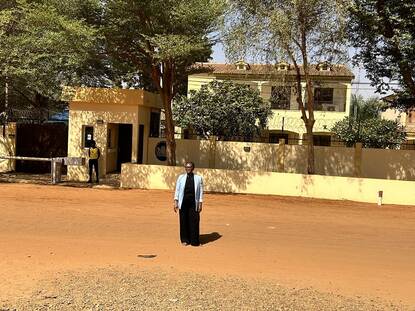Text Carmen Brinkman
Photo Josje Deekens
Do you want to see at a glance which leases will end within three to six months? Or find handy reports that enable you to perform year-end closure more efficiently? If so, look no further than MIBZ. MIBZ is a portal that gives BZ staff at the missions and in The Hague access to financial management information. Through its dashboards MIBZ supports accurate and transparent budget management, highlights risks and encourages data-driven decision-making. It also supplies data for external websites on development cooperation, the ministry’s budgets, and answers to parliamentary questions.
‘This portal helps us work smarter, make better decisions and optimise flows of information within BZ.’

‘I’m a bridge builder and want to make sure people at BZ find the information they need.'
Arjan van der Helm, leader of the MIBZ core team at the Financial and Economic Affairs Department (FEZ) explains: ‘I’m a bridge builder. As MIBZ product owner it's my job to make sure people at BZ find the information they need. MIBZ's strength is that it pools relevant information from different sources, such as SAP (our operational management system), IMPACT (our activity management system), and BMS (our system for amending budgets). The data is all collected in MIBZ and made available in a clear, visually appealing way by means of dashboards. BZ staff can refer to these dashboards to help them make informed choices and manage effectively.’
Smarter working
The MIBZ team introduced the MIBZ portal and dashboards to operational managers at the Vooruitkomdagen conference for controllers in 2022 and Operational Managers Week in 2023. Through six weeks of intensive half-hour sessions they learned how to make optimal use of the dashboards. ‘A handy feature of MIBZ is that it recognises you as a user when you log in,’ explains Ali Rezaei, of the MIBZ team. ‘A controller discovered a report in MIBZ that considerably simplified his year-end closure, resulting in enormous time savings. Operational managers can see information on the expiry of leases via a mission's contracts dashboard. With just a few clicks of the mouse, they can find out which contracts are due to expire within 3 to 6 months and assess the extent of upcoming tasks,’ says Ali.


MIBZ: a gateway to smarter, data-driven working These dashboards help us make better decisions and optimise flows of information within BZ.
Activity cycle
Arjan van der Roest, controller in Amman, uses MIBZ mainly for the activity cycle. He has MIBZ open every day for part of his work; the financial management of development activities. ‘The dashboards unlock clearly presented information on commitments, budget depletion and, for example, upcoming reports to be provided by our partners,’ he explains. ‘In the past I had to get information from lots of different sources. Now I can download all the data I need about the activity cycle in one dashboard. That saves lots of time trying to make sense of Excel sheets. Explanatory notes and the relevant HBBZ rules are just a mouse-click away when you've opened the dashboard. So MIBZ helps me work more efficiently.’
‘Need-to-know’ access
With over 1,800 active users, who together have already accessed the portal some 170,000 times over the past six months, MIBZ is firmly established at BZ. However, access is granted strictly on a need-to-know basis, in line with the General Data Protection Regulation (GDPR). ‘A person's position, role and duties determine what data they can see,’ explains Arjan van der Helm. ‘That way we ensure that information is not accessible without someone having a well-defined need to access it.’

More focus on policy information and external sources
MIBZ currently excels when it comes to supplying financial information, but in 2024 there will be a stronger emphasis on policy information, stresses Arjan van der Helm. The core team intends to focus on policy departments and their questions, regardless of whether someone is a country officer or a policy theme officer. ‘Substantive policy information will be a key priority, but providing figures and insights will remain relevant,’ adds Ali. ‘It gives you a real buzz to be involved in building up something like MIBZ,’ says Arjan. The next step is to collect open data from external sources and make it available to policy officers. MIBZ is also the source of all the data and reports that the ministry publishes, such as for the Organisation for Economic Co-operation and Development (OECD) and the International Aid Transparency Initiative (IATI). ‘MIBZ is also used as a source of data for own our dashboards for answering questions asked in parliament,’ adds Ali. ‘So it's valuable from a political perspective too, as it enables BZ to give accurate answers to questions.’
MIBZ dashboards
The MIBZ core team is currently directing its efforts towards building dashboards for 9 main processes, with a focus on the financial domain: the activity cycle, development cooperation policy data, operational management at the missions, processing and payment of invoices, financial management, procurement, client management, cash transactions and receivables management. An SSP form is available for requesting a new MIBZ dashboard or changes to an existing dashboard (in Dutch).
Cooperation and connection
A couple of years ago, the Information and Digital Innovation Department (IDI) launched an initiative to get the ministry to work in a more data-driven manner. ‘MIBZ is a great tool to help us bring this about,’ says Arjan. ‘Cooperation, both within the team and with other departments like IDI, has played a crucial rule in the success story that is MIBZ.’ ‘Colleagues at IDI not only have technical expertise, but also understand the ins and outs of financial record-keeping in SAP,’ says Ali. ‘That's an enormous help to us in our efforts to optimise MIBZ. Communication with users is also key. Feedback from them is invaluable.’
Find out more about the Financial and Economic Affairs Department (FEZ) and MIBZ
(NB: links to Rijksportaal can be accessed by central government staff only)












